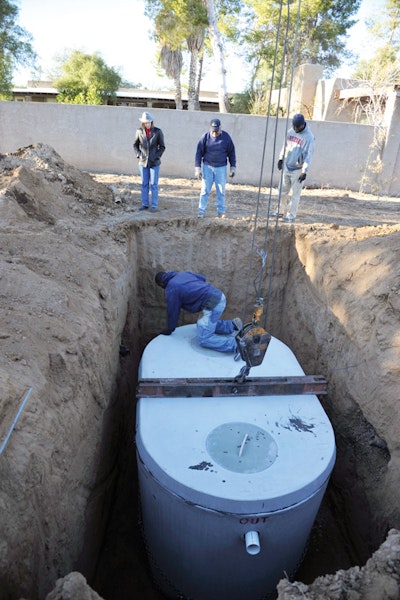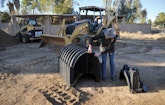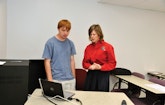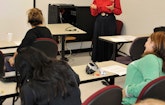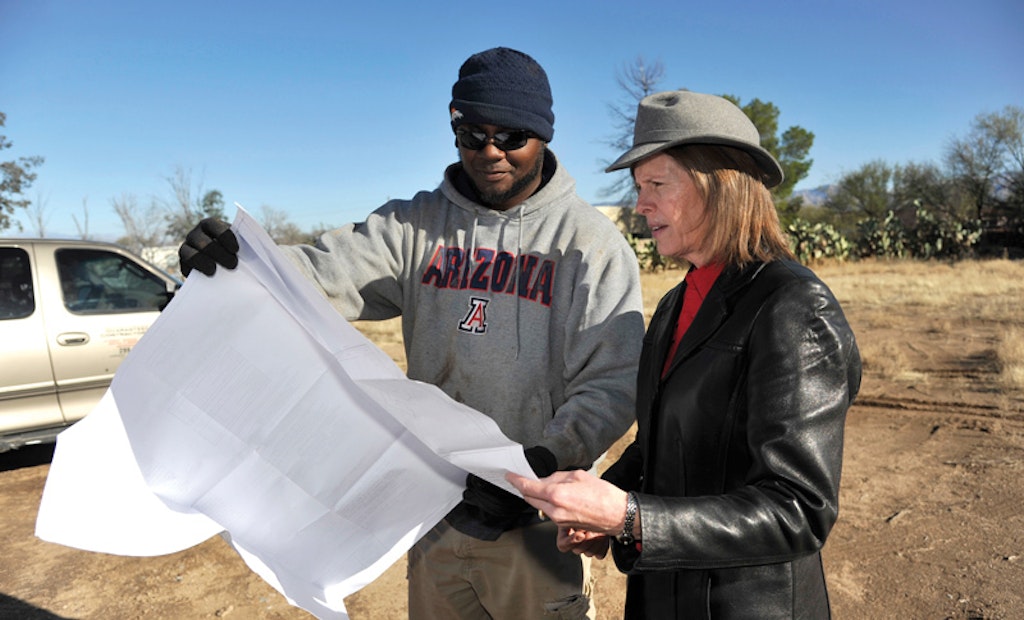
Interested in Systems/ATUs?
Get Systems/ATUs articles, news and videos right in your inbox! Sign up now.
Systems/ATUs + Get AlertsKathryn “Kitt” Farrell-Poe, Ph.D., liked the idea of being the only woman in the agricultural engineering course at the University of Nebraska-Lincoln.
On the first day of class in 1976, she sat in the back row and the men sat in front. The next class, she sat in the front row and the men sat behind her. At the third class, she sat in the middle, and the men encircled her. She has set the pace and the course ever since.
Her love of math, science and problem solving found perfect expression in her role as a water-quality specialist with emphasis on onsite systems. Employed as an Extension specialist and professor in the Agricultural and Biosystems Engineering Department at the University of Arizona in Tucson, she is also director of the College of Agriculture and Life Sciences (CALS) Extension Onsite Wastewater Education Program.
Her responsibilities as a Water Quality Extension Specialist include developing educational outreach programs that focus on onsite systems, safe drinking water, and nonpoint source pollution for regulators, onsite professionals, homeowners, teachers, and Cooperative Extension faculty and staff.
Elements of her work have found their way into programs of the Colorado Professionals in Onsite Wastewater and the Professional Onsite Wastewater Reuse Association of New Mexico. Conference presentations, research papers, fact sheets, videos, and DVDs by Farrell-Poe on safe drinking water and wastewater systems populate the websites of industry professionals and association newsletters.
Last year, CALS recognized Farrell-Poe’s education accomplishments, bestowing on her the 2011 Extension Faculty of the Year award. The college presents only one such award annually.
Twist of fate
Farrell-Poe earned her master’s degree in agricultural engineering from Purdue University, then worked two years at a private soil-testing facility in Lafayette, Ind., before beginning her doctoral work with the Civil Engineering Department at Purdue, specializing in environmental engineering.
Along the way she married, had a daughter and accepted a faculty position at Utah State University in the Agricultural Systems Technology and Education Department in the College of Agriculture. She earned a Ph.D. in civil engineering from Purdue in 1990.
Eight years later, her husband joined the faculty of the University of Arizona, and Farrell-Poe became associate professor in the Agricultural and Biosystems Engineering Department. While there, she recognized a new opportunity at an agricultural experiment field station in Yuma.
The state water quality Extension coordinator accepted a position elsewhere, and she acquired his job. She also inherited two grants with septic system education outreach components. “I had one lecture on septic systems while earning my environmental engineering degree, so I thought I’d better catch up fast,” she says.
In 2000 and 2002, Farrell-Poe attended the Consortium of Institutes for Decentralized Wastewater Treatment (CIDWT) academies and enjoyed the people. As she became more aware of the vast number of onsite systems and the importance of siting, design, installation, inspection, use and maintenance, she saw an opportunity to make a difference. But she fell in love with onsite while attending the first National Association of Wastewater Technicians (NAWT) inspector certification course in Fort Worth, Texas.
“I liked the class so much that I sponsored it for a pre-conference workshop at the 2002 Southwest Onsite Wastewater Management Conference in Laughlin, Nevada,” she says. “The course is now a regular pre-conference event. It sells itself once people attend it.” Farrell-Poe also became an instructor for the class.
In 2001, the Arizona Department of Environmental Quality (ADEQ) initiated onsite inspections for transfer of property, but didn’t make NAWT inspector certification and continuing education mandatory until 2006. “As an associate member of NAWT, any class I offer is co-sponsored by the organization, making recertification very affordable,” says Farrell-Poe. “It has certainly helped increase attendance.”
ABCs of wastewater
To develop the Extension’s Onsite Wastewater Education Program, Farrell-Poe received grants from EPA Region 9 and ADEQ to buy classroom and field equipment. Besides adopting NAWT and CIDWT inspection materials, she worked with Ed Swanson, then head of the ADEQ Water Quality Division, to adapt them to administrative code and to develop additional curriculum to qualify the courses for state certification. “So far, we’ve certified or recertified 1,568 inspectors,” says Farrell-Poe.
For the first few years, she saw excitement and high interest in the new inspection courses, but then the numbers began diminishing. She attributes the decline to the vast distances that separate pumpers in Arizona. “Isolation makes them very independent, and a few resist the necessary repeat training,” she says. “Typically, industry innovators are willing to return for continuing education because they see the positive effect it has on the profession and on their businesses.”
Farrell-Poe also became involved with the Arizona County Departments of Environmental Health Services Association, a group of environmental health directors. Through its onsite division, she attended soil science programs presented by Jerry Tyler, Ph.D., in the Department of Soil Science at the University of Wisconsin-Madison.
“I saw that soil and site evaluations were very important and something Arizona should have, so I developed a program with classroom and field components,” says Farrell-Poe. This is her proudest accomplishment: To date, 494 people have attended those classes, and 53 more have taken Advanced Soil Treatment.
Next came courses in Introduction to Onsite Design (99 participants to date) and Advanced Design (17), supported by manufacturers providing samples of their components. Farrell-Poe then brought the NAWT installer class to the state. When CIDWT needed a location to pilot its Operation and Maintenance course, she volunteered to coordinate the training for 20 people.
Anyone can do it
“I offered the installer course twice and had 61 attendees,” says Farrell-Poe. “The turnout was good the first time and not so good the second time around. Since then, I’ve been unable to fill a class. Without regulatory requirements, many people won’t come more than once.
“The first class I offer on any subject is always in testing mode, and I pay close attention to the evaluations on how to improve the course, handouts, presentations, topics covered, and even the location of the classes. Teaching a course a second and third time irons out the wrinkles, improving the educational experience for everyone.”
Inspired by centralized training centers in New England and Texas, Farrell-Poe established the Onsite Wastewater Training Facility at the Maricopa Agricultural Experiment Station. “Civil and environmental engineering professor Paul Trotta, Ph.D., was opening a training center at Northern Arizona University,” she says. “I thought it would be great to compare his cold, high-elevation, arid-condition center with my low-desert, warm-weather, sandier-soils center. That was before I knew better.”
Although the facility was 25 miles from the city, it represented 90 percent of the state’s climate and soils. Farrell-Poe held an installer class and soils class at the center, but attendees found the location inconvenient. “I planned to do more training there, but realized the vastness of our state made a centralized location impractical,” she says. “It’s easier for me to travel to a group of people than to have them come to the facility.”
Using what is there
Farrell-Poe is reluctant to claim that her influence extends beyond the state; she prefers to note that New Mexico has increased its education program as its regulatory scheme becomes more like Arizona’s. “I think the Colorado onsite association modeled its soil and site evaluation course from ours, but I don’t know if they used our entire program,” she says.
According to Farrell-Poe, the quickest way for states to develop training programs is to bring in CIDWT and NAWT courses. “In addition, I have all kinds of agendas and ideas that I’m willing to share, and I’d be happy to help groups with their materials,” she says. “I’ve kept break-even cost tables and can give them clues as to what has and hasn’t worked for me.
Besides her Extension duties, Farrell-Poe is a professor and instructor. Using a university grant, she worked with Trotta to develop a three-credit online course, Design of Onsite Wastewater Treatment Systems, for undergraduate and graduate students. “I’m also proud of that class, which I’ve taught every other spring semester since 2001,” she says. “I’m probably one of the first in the university system to have such a course.”
Homeowners and regulations
As a Water Quality Extension Specialist, Farrell-Poe is involved with private wells, safe drinking water, and educating homeowners about their onsite systems. She has written numerous fact sheets for handouts at homeowner seminars or for professionals to download, print, and pass to customers.
The information has been distributed on industry websites across the country, often without a byline. Farrell-Poe’s latest article, 10 Things Realtors Should Know about Septic Systems, coauthored by Dawn Long, was published in the May 2012 issue of Arizona Realtor magazine.
Besides serving on the board of the Arizona Onsite Wastewater Recycling Association, Farrell-Poe is on the ADEQ and Pima County Onsite Wastewater Advisory Committees, and is a nonvoting member of the Onsite Technical Advisory Group (OTAG) of the Arizona County Departments of Environmental Health Services Association.
“These groups are promoting professionalism throughout the onsite industry,” she says. “Currently, only inspectors for the transfer of ownership program and soil and site evaluators must be certified. We’re requesting regulations that require education and certification for installers, service providers, and designers.”
Farrell-Poe also is promoting regulations that will standardize the language based on the CIDWT onsite glossary, while OTAG is revising the ADEQ transfer of ownership inspection form. “I’m hoping the regulatory certification requirements will allow reluctant people to realize the worth of continuing education, and from then on they will be inspired to grow professionally,” she says.
After 11 years of implementing her program, Farrell-Poe sees an increased interest in professionalism. “The people who do it correctly, get the education, and abide by the rules are really interested in leveling the playing field, which can only be done through regulation,” she says. “I find that extremely gratifying. So is seeing a heightened awareness among regulators, homeowners, and real estate agents identifying the correct things to do, then doing them.”
